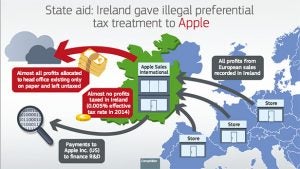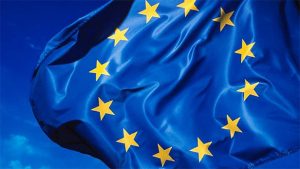Apple’s £11bn unpaid tax bill: 7 things you need to know about ‘devastating’ EU ruling

Apple will have to repay billions of euros after an EU ruling declared that Ireland gave the tech giant “illegal tax benefits”. Here’s what you need to know.
1. Apple (and Ireland) are in huge trouble
The European Commission has concluded that Ireland gave Apple “illegal tax benefits”, amounting to 13 billion euros – that’s about £11 billion or $14.5 billion. Ouch.
EU law currently dictates that national tax authorities – like Irish Tax & Customs – cannot give tax benefits to specific companies. If this happens, it’s technically considered to be illegal “state aid” under EU law.
According to the European Commission, Apple has arranged two separate deals with Irish authorities, and took advantage of its company structure to squeeze international sales through Ireland, resulting in significantly reduced tax.
2. It’s very long, and very complicated
The European Commission began formally investigating Apple’s European tax arrangements by launching an inquiry in September 2014. This followed the publication of findings that suggested deals between Apple and Ireland in 1991 and 2007 were unlawful.
These two tax rulings allowed a dodgy system for taxing the profits of two Irish incorporated companies of the Apple group that the Commission says “did not correspond to economic reality”.
These two companies in question are Apple Sales International and Apple Operations Europe. Nearly all sales profits recorded by both companies were internally attributed to a “head office”, but the Commission says these “head offices” existed in paper form only, and “could not have generated such profits”.
This meant that, thanks to the provisions of Irish tax law, the profits allocated to the “head offices” weren’t subject to tax in any country.
But it gets even more interesting: Ireland’s tax treatment also allowed Apple to avoid taxation on almost all profits generated by the sales of its products across the entire EU Single Market. That’s because Apple decided to record all sales in Ireland, rather than in the countries where the products were sold.
However, this loophole structure is outside the remit of the EU’s state aid control. Other countries would need to require Apple to pay more tax on the profits of the two companies over the same period under their own national taxation rules, which would then reduce the amount that Ireland needs to recover.

3. The bill is bigger than we expected
Apple is going to pay far in excess of what many expected, with a bill amounting to 13 billion euros (£11 billion, $14.5 billion). It may have been higher, but the Commission can only order the recovery of illegal state aid for a ten-year period preceding its first request for information, which was in 2013. That means Ireland now needs to recover unpaid taxes from Apple for the years 2003 to 2014. That’s 13 billion euros, plus interest.
That’s in contrast to a recent Irish Times report that said
However, the final figure falls short of that cited by investment bank JP Morgan, which said that if the Commission forced Apple to back-pay taxes collected in Ireland at the country’s corporate rate of 12.5% (on pre-tax profits), it would result in an incredible £15 billion bill.
4. The Commission is cracking down
There’s no mincing of words here: the European Commission says what Ireland did was illegal. Competition Commissioner Margrethe Vestager said:
“Member States cannot give tax benefits to selected companies – this is illegal under EU state aid rules. The Commission’s investigation concluded that Ireland granted illegal tax benefits to Apple, which enabled it to pay substantially less tax than other businesses over many years. In fact, this selective treatment allowed Apple to pay an effective corporate tax rate of 1 per cent on its European profits in 2003, down to 0.005 per cent in 2014.”
The Commission also confirmed that it has two ongoing – and “in-depth” – investigations into concerns over tax rulings related to state aid issues in Luxembourg, specifically regarding Amazon and McDonald’s. Previously, the Commission concluded that Luxermbourg and the Netherlands had given selective tax advantages to Fiat and Starbucks, respectively.
 European Commission ruling means Ireland will be forced to recoup lost tax
European Commission ruling means Ireland will be forced to recoup lost tax
5. Tim Cook isn’t happy
Apple has previously denied any and all wrongdoing, naturally. In fact, Apple CEO Tim Cook even slammed the inquiry as “political crap”, and confirmed that the company plans to appeal against any ruling that suggests Apple has received state aid in Ireland. At the time, Cook said: “Apple pays every tax dollar we owe.”
He also responded in the form of a statement today. Here’s an excerpt:
“The European Commission has launched an effort to rewrite Apple’s history in Europe, ignore Ireland’s tax laws, and upend the international tax system in the process. The opinion issued on August 30 alleges that Ireland gave Apple a special deal on our taxes. This claim has no basis in fact or in law. We never asked for, nor did we receive, any special deals. We now find ourselves in the unusual position of being ordered to retroactively pay additional taxes to a government that sayes we don’t owe them any more than we’ve already paid.”
The open letter went on to describe the Commission’s ruling as “unprecedented”, and claims that the EU is “effectively proposing to replace Irish tax laws”. Cook added: “This would strike a devastating blow to the sovereignty of EU member states over their own tax matters, and to the principle of certainty of law in Europe.”
We’ve posted Tim Cook’s full statement at the bottom of this article.
6. The US government isn’t happy either
Unsurprisingly, the US government shares Tim Cook’s concerns about the EU’s apparent meddling in what it sees as stateside affairs. Just last week, the US Treasury accused the European Commission of trying to become a “supranational tax authority”, and said that any ruling that forced Apple to pay back-taxes would set an “unfortunate international tax policy precedent”.
A report commission by US Treasury Secretary Jack Lew read: “The companies’ US tax liability would be reduced dollar for dollar by these recoveries.
But this is in spite of a 2013 US Senate investigation that found that Apple paid minimal tax on profits of $74 billion (and perhaps even more) over four years, thanks to a series of loopholes in the tax codes of both Ireland and the USA. However, the investigation found no illegal activity.
7. But Apple will still have to pay
The bad news for Apple is that, as a member of the EU, Ireland’s hands are tied. If a member state wants to appeal a Commission decision (which both Ireland and Apple have now committed to), then the state still has to recover the illegal state aid.
That means Ireland has to recoup the cash from Apple no matter what. However, it can temporarily place the recovered amount in an escrow account – that’s an account held by a third-party, i.e. not Ireland or Apple. This money then may or may not be returned, pending the outcome of the EU court decision.
Related: iPhone 8
Tim Cook’s Open Letter
A Message to the Apple Community in Europe – August 30, 2016
Thirty-six years ago, long before introducing iPhone, iPod or even the Mac, Steve Jobs established Apple’s first operations in Europe. At the time, the company knew that in order to serve customers in Europe, it would need a base there. So, in October 1980, Apple opened a factory in Cork, Ireland with 60 employees.
At the time, Cork was suffering from high unemployment and extremely low economic investment. But Apple’s leaders saw a community rich with talent, and one they believed could accommodate growth if the company was fortunate enough to succeed.
We have operated continuously in Cork ever since, even through periods of uncertainty about our own business, and today we employ nearly 6,000 people across Ireland. The vast majority are still in Cork — including some of the very first employees — now performing a wide variety of functions as part of Apple’s global footprint. Countless multinational companies followed Apple by investing in Cork, and today the local economy is stronger than ever.
The success which has propelled Apple’s growth in Cork comes from innovative products that delight our customers. It has helped create and sustain more than 1.5 million jobs across Europe — jobs at Apple, jobs for hundreds of thousands of creative app developers who thrive on the App Store, and jobs with manufacturers and other suppliers. Countless small and medium-size companies depend on Apple, and we are proud to support them.
As responsible corporate citizens, we are also proud of our contributions to local economies across Europe, and to communities everywhere. As our business has grown over the years, we have become the largest taxpayer in Ireland, the largest taxpayer in the United States, and the largest taxpayer in the world.
Over the years, we received guidance from Irish tax authorities on how to comply correctly with Irish tax law — the same kind of guidance available to any company doing business there. In Ireland and in every country where we operate, Apple follows the law and we pay all the taxes we owe.
The European Commission has launched an effort to rewrite Apple’s history in Europe, ignore Ireland’s tax laws and upend the international tax system in the process. The opinion issued on August 30th alleges that Ireland gave Apple a special deal on our taxes. This claim has no basis in fact or in law. We never asked for, nor did we receive, any special deals. We now find ourselves in the unusual position of being ordered to retroactively pay additional taxes to a government that says we don’t owe them any more than we’ve already paid.
The Commission’s move is unprecedented and it has serious, wide-reaching implications. It is effectively proposing to replace Irish tax laws with a view of what the Commission thinks the law should have been. This would strike a devastating blow to the sovereignty of EU member states over their own tax matters, and to the principle of certainty of law in Europe. Ireland has said they plan to appeal the Commission’s ruling and Apple will do the same. We are confident that the Commission’s order will be reversed.
At its root, the Commission’s case is not about how much Apple pays in taxes. It is about which government collects the money.
Taxes for multinational companies are complex, yet a fundamental principle is recognized around the world: A company’s profits should be taxed in the country where the value is created. Apple, Ireland and the United States all agree on this principle.
In Apple’s case, nearly all of our research and development takes place in California, so the vast majority of our profits are taxed in the United States. European companies doing business in the U.S. are taxed according to the same principle. But the Commission is now calling to retroactively change those rules.
Beyond the obvious targeting of Apple, the most profound and harmful effect of this ruling will be on investment and job creation in Europe. Using the Commission’s theory, every company in Ireland and across Europe is suddenly at risk of being subjected to taxes under laws that never existed.
Apple has long supported international tax reform with the objectives of simplicity and clarity. We believe these changes should come about through the proper legislative process, in which proposals are discussed among the leaders and citizens of the affected countries. And as with any new laws, they should be applied going forward — not retroactively.
We are committed to Ireland and we plan to continue investing there, growing and serving our customers with the same level of passion and commitment. We firmly believe that the facts and the established legal principles upon which the EU was founded will ultimately prevail.
Do you think Apple should pay back taxes in the EU? Let us know in the comments.


